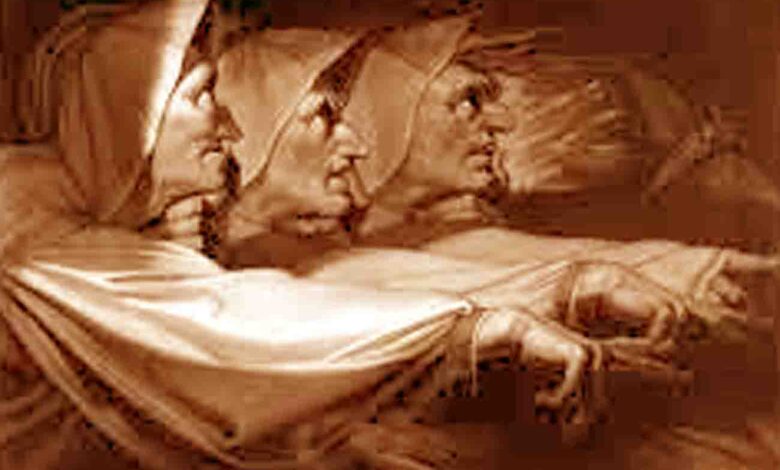Black pits of Universal Nature: Abetting Evil in life?

VIEWPOINT
 Romit Bagchi
Romit Bagchi
The debate and discourse on the three ‘wyrd’ sisters’ in one of the greatest Shakespearean tragedies Macbeth is endless. This is natural, given the deep mystery shrouding them. They are human and non-human at the same time and every sentence they utter is eerily pregnant with double-voiced ambiguity.
Some of the Shakespearean critics opine that their introduction in Macbeth is a weakness of the play, marking its departure from the greatest tragedies of the time. “If the play had been written during my time Shakespeare might have been banished from the theatre,” Dr Johnson says disapprovingly.
Some, however, view them as beings who, though humans, possessed uncanny power to correctly read thoughts of human minds and then choose those in whom they would detect greed and moral ambivalence as their agents to execute their sinister schemes in life. They argue that these three sisters understood that Macbeth was inherently a greedy man though lacking the requisite strength to go all-out to satisfy his greed. So, he must be coaxed into desperation with the vestiges of morality left in him wiped out. These critics suggest that these creatures, bereft of any supernatural power to directly act on life, must depend on their chosen agents to unleash the evil on life.
Some critics are, however, convinced that these three sisters embodied pure evil-both plotters and executors with sinister grip on life-searching for their prey to be lured into selling themselves out to them.
As some horrific crimes-which appear to lie beyond the pale of what we consider human-continued to happen across the country, the shell-shocked people were driven to think of how the perpetrators could commit them despite knowing that they would be caught and then brought to justice. They know, too, that these crimes will not only ruin themselves but also ruin their families and posterities. And yet, nothing deters them. I, too, felt compelled to seek to comprehend the enigma of their psychology and the irresistible lure of evil which easily outweighs the presence of all that is good in life.
The materialists deny that there is anything like good and evil in nature as nature is supposed to be impartial to both. The instinctive impulses of evil originate in humans, they argue, which is a common heritage of all humanity from its primitive past. They say quite rightly that we are largely involved in animal nature with cultural development and civilised behaviour still remaining a far-off consummation.
Yet, I was not fully satisfied with the pure materialist explanation though I could hardly deny the facts they present. I felt that though logical, this could not completely explain the monstrous nature of such crimes. As humans, we have a mind that seeks to disengage from the instinctive operations of our life-self. As humanity evolves, the power of mind over life grows and we learn to suppress if not sublimate the barbarian lurking in ourselves with a conscience developing slowly with the progress of evolution.
However, as regards the case under our study, we may say that if twinge of conscience cannot be expected from them they should at least have some concern for self-preservation which is considered to be a fundamental principle of basic survival instincts in most organisms, including humans. They know it well that there is a well-built justice system that furiously avenges crimes even if it is unable to stop them. They seem reckless, ready to face consequences.
That was when my mind-stirred by the weird Macbethian world characterised by the chaotic mix of ambition, violence, treachery and the supernatural– fell back on the religious/spiritual traditions of the world which speak of the supra-physical planes existing along with the material world and powerfully impacting the life here with the humans remaining completely unaware of their operations. Spiritual experiences of the world testify to the fact that with invisible life existing behind and above the visible life, the latter is a grim battlefield where the powers of light and the powers of darkness are engaged in a fierce and perpetual combat to possess the earth- life.
Sri Aurobindo notes: “The Asuras and Rakshasas do not belong to the earth, but to supra-physical worlds, but they act upon earth-life and dispute the control of human life and character and action with the Gods. They are the Powers of Darkness combating the Powers of Light…Sometimes they possess men, sometimes they take birth in the human body.”
But we have a free will or individual energy which could reject the suggestions thrown up by the powers of darkness and negate the influences of the universal energies on us. The more we are evolved, the stronger our free will. Still, we are precariously vulnerable. If, goaded by the cravings from our primitive self, we open ourselves to these forces of evil they, elated, will invade and flood us. When the inner conflict ceases we cease to be humans and the possession becomes total. So, we are under a double threat from within and without: primitive impulses lurking in us and seeking satisfaction and the demonical cosmic forces waiting close to us to intrude and possess us, driving life towards pure evil.
Now, let us see how Shakespeare, a seer of life, fashions the complexity in the characters of Macbeth and Lady Macbeth.
Macbeth had a free will with commitment to his individual good and collective good of Scotland. But the enigmatic forces realised that despite his strength and courage, he had ambition present in him which could be inflated to neutralise his conscience. So, what they told him immediately stirred a deep chord of response in him. Yet, their influences faced stiff resistance in him. The lure of ambition, bolstered by the weird sisters’ prophecies, kept on struggling grimly with his conscience. Initially, it acted in him in the form of a fear of being caught and subjected to collective reprobation and then in the form of the fear of moral retribution to be unleashed by the forces of life themselves with the dark actions returning to plague their perpetrators with Karma rebounding. When he was wrestling with an intense inner conflict, Lady Macbeth stepped in with her crude exhortations to her dithering husband’s sense of valour and manhood. His resistance then crumbled down and he resolved the inner conflict. But once his inner conflict was resolved he ceased to be a man.
Lady Macbeth, on the other hand, was a flat and weak character and so the forces pressing Macbeth into action found an easier access in her. When she opened herself to them the possession was total. But soon after King Duncan’s murder, her limited energies exhausted and this led to fast disintegration of her being, culminating in her madness and offstage suicidal death.






